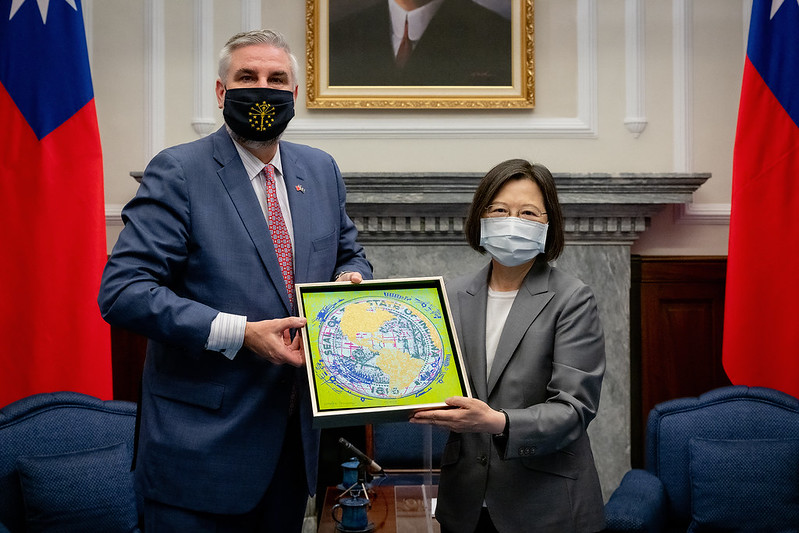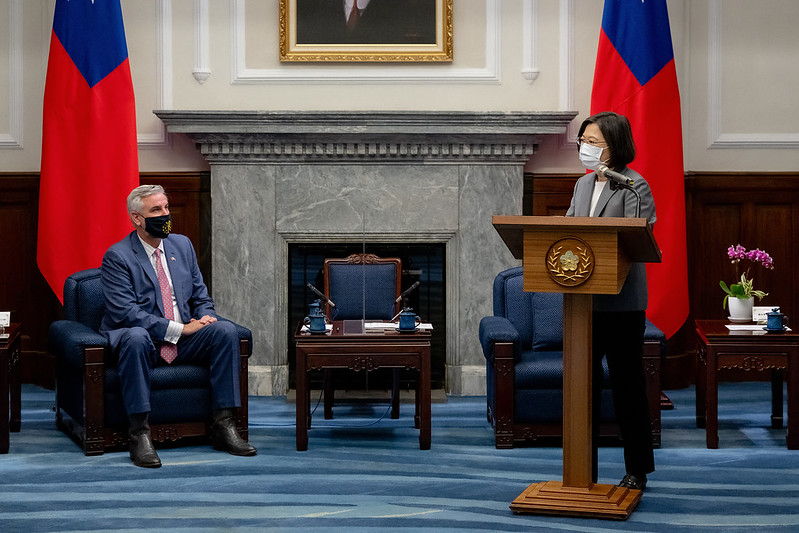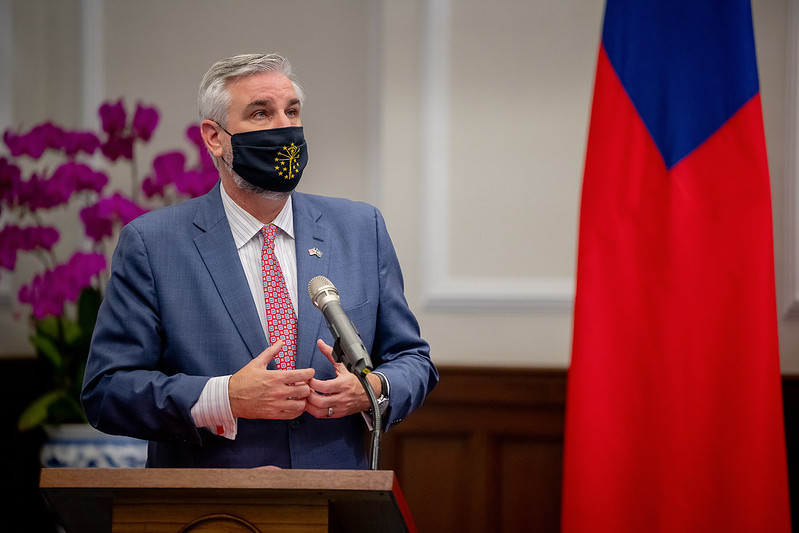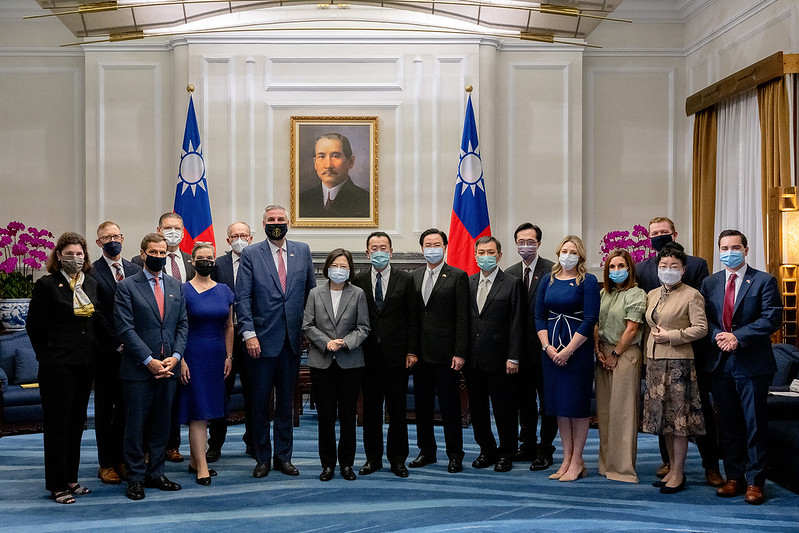News & activities
 News releases
News releases
On the morning of August 22, President Tsai Ing-wen met with a delegation led by Indiana Governor Eric Holcomb. In remarks, President Tsai emphasized that Taiwan is willing and able to strengthen cooperation with democratic partners in building sustainable semiconductor supply chains. The president said that at this moment, democratic allies must stand together and comprehensively strengthen cooperation, and expressed hope that Taiwan and the United States can work on the foundation of our existing collaboration to support each other and forge closer ties.
A translation of President Tsai's remarks follows:
I want to welcome you all to the Presidential Office. Governor Holcomb is leading a delegation to Taiwan for the first time, and he is also the first US governor to visit Taiwan since the onset of the COVID-19 pandemic. This delegation carries profound significance for the deepening of Taiwan-US relations.
Taiwan and the United States are partners who both love democracy and freedom, and are key security and economic allies in the Indo-Pacific region. Taiwan-US relations have seen much progress in recent years. I have received many prominent US political figures from both sides of the aisle, as well as friends from think tanks and academic circles. Recently, this has included delegations led by House of Representatives Speaker Nancy Pelosi and Senate Foreign Relations Subcommittee Chairman Ed Markey, and now includes our dear friends from Indiana. These visits have had a profound impression on us. The broad spectrum of staunch US support for Taiwan is enabling us to further deepen Taiwan-US cooperation across a range of fields.
On August 9, President Biden signed the CHIPS and Science Act, which seeks to promote semiconductor research, development, and production and to bolster supply chain security. With the passage of the act, Indiana stands to become a center for emerging technology within the US semiconductor industry. And Purdue University, an important academic institution in Indiana, has just established the Krach Institute for Tech Diplomacy and a Semiconductor Degrees Program.
These developments align perfectly with those in Taiwan. Our semiconductor industry plays a key role in global supply chains. We have worked with universities to establish four major semiconductor academies, accelerating the development of the next generation of tech talent. From your itinerary, I see that you are visiting a number of high-tech business leaders, as well as witnessing the signing of MOUs on academic exchange and cooperation between Purdue University and National Yang Ming Chiao Tung University (NYCU) as well as National Cheng Kung University (NCKU).
Economic security is an important pillar of national and regional security. Taiwan is willing and able to strengthen cooperation with democratic partners in building sustainable semiconductor supply chains. Together, we can safeguard our common values and create even greater prosperity.
Presently, we are facing the continued expansion of global authoritarianism. In the midst of this, Taiwan has been confronted by military threats from China in and around the Taiwan Strait. At this moment, democratic allies must stand together and comprehensively strengthen cooperation.
Indiana and Taiwan enjoy a longstanding bond. Indiana was Taiwan's first US sister state, and our peoples enjoy close exchanges. Every one of today's distinguished guests is a dear friend of Taiwan. Building on our existing foundation of collaboration, I look forward to our two sides supporting each other and advancing hand in hand to forge closer ties and deepen cooperation. Thank you.
Governor Holcomb then delivered remarks, a transcript of which follows:
Madam President, it is indeed a high honor to be here with our longtime friends from Taiwan.
Thank you, President Tsai, for your and your team's warm hospitality, literally from the first step off the plane. And we expect this to continue on our days ahead.
Thank you for welcoming Secretary Chambers and Dean Lundstrom from Purdue University, as you mentioned, and really our entire delegation to beautiful Taipei. We've all been looking very much forward to this very day.
I bring you greetings from 6.8 million of my neighbors – we call ourselves Hoosiers – and from, as you mentioned, your sister city of Indianapolis, our capital city and your sister city. [This sister-city] relationship was the first for both of us, going back 44 years ago.
We are so grateful for our enduring friendship and partnerships that have been built over the years, and the strong bond that you talked about that grows even stronger by the day, as strong as the Indiana limestone that we're famous for producing.
And, by the way – I'm glad you mentioned it – it does feel good being the first to arrive in Taiwan since before the pandemic. You never get a second opportunity to be first, so I'm glad we got here swiftly.
I should note [that] one of my predecessors, now the president of Purdue University, was in Taiwan when he was governor back in 2005. And subsequently, from that point, we've had other leaders from Indiana visit, like [the] executive director of our Department of Agriculture, who visited regarding our agriculture ties and trade, something very near and dear to both of us.
You also mentioned something very important to Hoosiers, and that is, because we share so many common values and interests and goals, there are more opportunities ahead of us, [more] than I think there ever have been before, for us to continue to strengthen and cultivate and nurture this relationship as our economies grow and grow together. We will continue to seek to build strategic partnerships with you.
This very type of economic engagement is very important to both of us. For example, Indiana is a leader in terms of foreign direct investment in America. And we're so pleased and honored to have 10 Taiwanese companies as part of that investment portfolio. Most notably, MediaTek joined our portfolio, and we look so forward to working with them in designing the future.
In fact, we're boldly embracing that future and determining what our destinies will be by creating and commercializing the products and solutions that are called for with the cutting-edge technology that will get us there.
Please know [that] Indiana's commitment to building a resilient economy of the future starts with strengthening these very bonds between both of us and our shared values. Because it's a timeless truth that who you [partner] with matters.
And with partners like Taiwan, I'm confident that together, we will continue to innovate our way into the future, present global solutions, and conduct [the] groundbreaking research necessary to propel us all forward.
Madam President, if you could see my expression, I am smiling ear to ear right now, excited about signing these memorandums – plural – of understanding and what they will lead to, how they will usher in and muster our collective energy and action and turn that into motion and activity.
The Indiana-Taiwan agreement is focused on building upon those economic ties and critical industries, as you mentioned, like semiconductors, [agricultural and biological] science, advanced manufacturing, and technology. And the Purdue University memorandums of understanding that they will sign [with NYCU and NCKU] will equally propel us forward on that research front in those areas and many more.
It's critically important to have a world class university like Purdue University involved [in] this endeavor, because we both know that a key component of any successful society is talent and cultivating that talent, both for today and for the future. That leads to upward mobility options and possibilities, and enables individuals to determine their own destiny.
And lastly, the world knows that supply chain management and resiliency itself – semiconductor design and production, and advanced high-tech research and development – ultimately affects us all every day in every way.
Thank you again. It is an honor to be with you. And thank you for hosting us and the, again, extraordinarily warm welcome that we have already received. Your continued friendship to Indiana is priceless to us. And the people of Indiana will always reciprocate. We both seek to deepen and enhance our already excellent cooperation that we've established over the years. Madam President, I look forward to our shared future and the golden age of innovation and investment that lies ahead for both of us.
Among the members of the delegation were Indiana State Secretary of Commerce Bradley Chambers, who also serves as CEO of the Indiana Economic Development Corporation, and Prof. Mark Lundstrom, interim dean of the College of Engineering at Purdue University.












